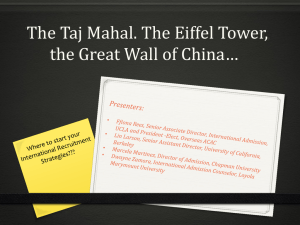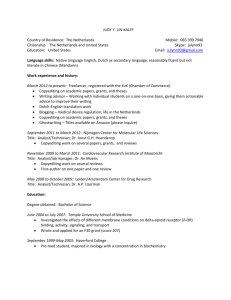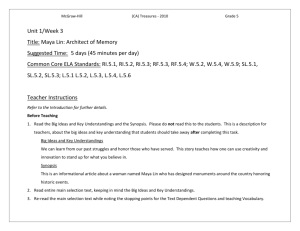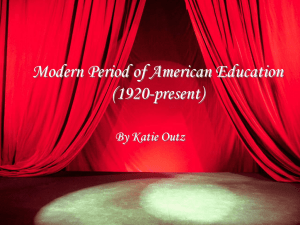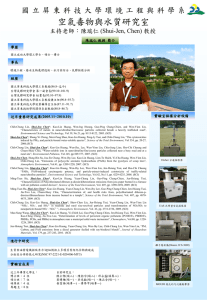Maya Lin & the Vietnam Memorial
advertisement
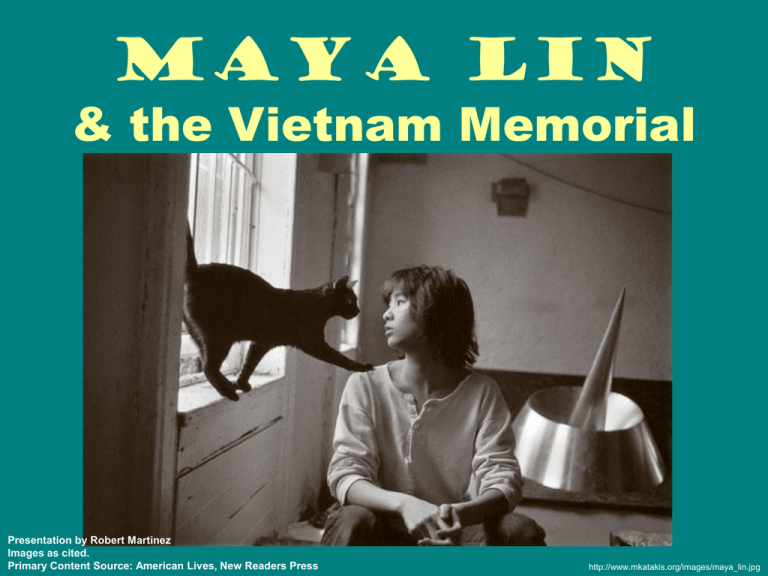
Maya Lin & the Vietnam Memorial Presentation by Robert Martinez Images as cited. Primary Content Source: American Lives, New Readers Press http://www.mkatakis.org/images/maya_lin.jpg The American Dream Maya Lin is the daughter of Chinese immigrants. Her parents left China in the 1940s. http://en.wikipedia.org/wiki/Maya_Lin Her mother was a poet, and taught English and Asian literature. Her father was a wellknown ceramic artist. He also directed the fine arts program at Ohio University. http://www.nytimes.com/2008/03/08/arts/08publ.html?_r=1&n=Top/Reference/Times%20Topics/People/L/Lin,%20Maya Lin’s parents didn’t talk about their past in China. They didn’t teach Lin and her brother the Chinese language. Lin said she felt more American than Chinese while she was growing up. http://topics.nytimes.com/top/reference/timestopics/people/l/maya_lin/index.html As a child, Lin was surrounded by artwork and furniture that her father made. She often made pottery in her father’s studio at the university. http://www.flickr.com/photos/31477229@N00/386499177/ In high school, she was interested in modern European literature. At the same time, she became interested in death. http://prelectur.stanford.edu/lecturers/lin/images/mayalb.jpg After high school, Lin enrolled at Yale University. She took many trips to the local cemetery and photographed headstones. She admired the serenity of the simple designs. http://freepages.genealogy.rootsweb.ancestry.com/%7Elanehistory/Lane%20Headstones.jpg In Denmark, she visited a cemetery that was also used as a park in the summer. Lin saw that the cemetery was an important part of everyday life. This use of the cemetery fascinated her. http://www.stjohnhistoricalsociety.org/Articles/DanishCemetery.jpg When she returned to Yale, she enrolled in a funerary architecture class, a class that studied memorials for the dead. http://www.amdoc.org/projects/truelives/pressroom/mayalin/images/02_mayalin.jpg As a class assignment, the professor asked the students to enter a nationwide competition to design the Vietnam Veterans Memorial. http://redmig.com/sp_Vinti_HN_files/image028.jpg The students all went to Washington, D.C. They visited the location of the future memorial. It was between the Lincoln Memorial and the Capitol building. http://www.visitingdc.com/images/national-mall-at-night.jpg Lin saw a few people playing catch on the grass there. They reminded her of the cemetery-park in Denmark. She got the idea to build a “gravestone in a park.” http://www.stpete.org/HR_Photos/0810.jpg Lin submitted an innovative design for the competition. She designed two large, black, granite walls that formed a V shape. http://en.wikipedia.org/wiki/File:MayaLinsubmission.jpg On the walls would be carved the name of every American who had died or was missing in the Vietnam War. Almost 58,000 names would be cut into the stone. http://www.amdoc.org/projects/truelives/pressroom/mayalin/images/05_mayalin.jpg http://www.loc.gov/exhibits/treasures/images/at00827cs.jpg Visitors could touch and photograph the names. Lin hoped that this experience would comfort people who had lost loved ones in the war. Lin won the competition, she was only 21 years old. http://www.flickr.com/photos/joschmoblo/161648060/ When her design became public, its quiet beauty impressed many people. However, some veteran’s groups thought that the design did not honor the dead and missing soldiers enough. http://www.usvetdsp.com/maya_lin.jpg They thought that it did not look patriotic. The groups wanted a statue of a soldier instead. And some people made racist remarks because of Lin’s Asian background. http://www.usvetdsp.com/maya_lin.jpg Lin was under a lot of pressure to change her design. But she kept her original plan. As a compromise, the government allowed the groups who opposed Lin’s design to put up a statue. http://www.flickr.com/photos/mamanance/42856531/ The statue shows three servicemen with a U.S. flag. It stands near the entrance to the memorial. http://www.flickr.com/photos/debsmouse/2206524507/ The Vietnam Veterans Memorial, built using Lin’s design, opened on November 13, 1982. It is now the most visited memorial in the United States. http://www.greenmuseum.org/c/aen/Issues/lin.php
